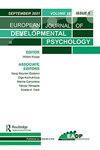The psychometric properties of the Hungarian Parental Reflective Functioning Questionnaire
IF 2.1
4区 心理学
Q3 PSYCHOLOGY, DEVELOPMENTAL
European Journal of Developmental Psychology
Pub Date : 2023-10-30
DOI:10.1080/17405629.2023.2276482
引用次数: 0
Abstract
ABSTRACTParental reflective functioning refers to the ability of parents to understand their child as motivated by internal mental experiences such as thoughts and feelings. This study aimed to examine the factor structure of the Hungarian version of the Parental Reflective Functioning Questionnaire (PRFQ) and to assess its relationships with general reflective functioning (Certainty and Uncertainty), attachment dimensions (Confidence, Relationships as secondary, The need for approval, Discomfort with closeness, Preoccupation with relationships) and the perception of the child (Warmth and Invasiveness) among mothers of children up to five years of age. Two hundred sixty-three mothers completed the PRFQ and The Reflective Functioning Questionnaire, of which 201 mothers also completed the Mothers’ Object Relations Scale and The Attachment Style Questionnaire. Confirmatory factor analyses supported the three-factor solution. Cronbach’s alpha coefficients for Certainty about Mental States and Interest and Curiosity subscales were excellent, while it was lower for Pre-Mentalizing.KEYWORDS: Mentalizingreflective functioningparental reflective functioningvalidationattachment Disclosure statementNo potential conflict of interest was reported by the author(s).Data availability statementThe dataset generated during and/or analysed during the current study is available upon reasonable request from the corresponding author.匈牙利父母反思性功能问卷的心理测量特征
【摘要】父母反思功能是指父母理解孩子受到思想、情感等内在心理体验的激励的能力。本研究旨在检验匈牙利版父母反思功能问卷(PRFQ)的因素结构,并评估其与一般反思功能(确定性和不确定性),依恋维度(信心,关系作为次要的,需要批准,亲密不适,对关系的关注)和儿童感知(温暖和侵入性)之间的关系。263名母亲完成了PRFQ和反思功能问卷,其中201名母亲还完成了母亲客体关系量表和依恋类型问卷。验证性因子分析支持三因素解决方案。“心理状态确定性”和“兴趣和好奇心”分量表的Cronbach α系数非常好,而“前心理化”分量表的Cronbach α系数较低。关键词:心智化;反思性功能;父母反思性功能;数据可用性声明在当前研究期间生成和/或分析的数据集可根据通讯作者的合理要求提供。
本文章由计算机程序翻译,如有差异,请以英文原文为准。
求助全文
约1分钟内获得全文
求助全文
来源期刊

European Journal of Developmental Psychology
PSYCHOLOGY, DEVELOPMENTAL-
CiteScore
3.70
自引率
0.00%
发文量
35
 求助内容:
求助内容: 应助结果提醒方式:
应助结果提醒方式:


